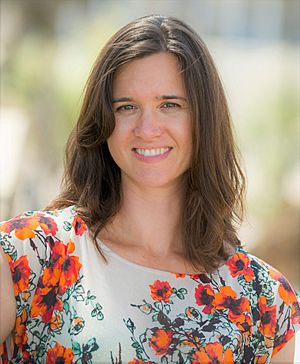Brenda Bloodgood facts for kids
Brenda Bloodgood is an American scientist who studies the brain. She is a professor of neurobiology at the University of California, San Diego. Dr. Bloodgood explores how our brains change and adapt based on what we experience around us. She looks closely at the tiny parts of brain cells to understand these changes.
Contents
Early Life and Education
Discovering a Passion for Science
When Brenda Bloodgood was in high school, she joined a special science program at Columbia University. This program allowed her to ask big questions and create her own science experiments. It was here that she realized she loved neuroscience and wanted to make it her career.
College and University Studies
After high school, Dr. Bloodgood first attended a community college in California. She then transferred to the University of California, San Diego (UCSD). There, she earned her bachelor's degree in Animal Physiology and Neuroscience in 2001. While at UCSD, she worked as a research assistant in a lab at the Salk Institute for Biological Studies.
Advanced Brain Research
Dr. Bloodgood continued her studies at Harvard Medical School, where she earned her PhD in 2006. Her research focused on how brain cells communicate. She even published an important paper in the journal Science. This paper explained how signals move between parts of brain cells called dendritic spines.
After her PhD, she stayed in Boston for her postdoctoral studies at Harvard Medical School. She studied a protein called Npas4. This protein helps control how brain cells work, especially at connections called inhibitory synapses. Dr. Bloodgood found that Npas4 helps rearrange these connections when we experience new things. This makes brain cells better at gathering information before sending it to other parts of the brain.
Career and Research
Starting Her Own Lab
In 2012, Dr. Bloodgood returned to the UCSD. She started her own neurobiology lab there. Her lab's main goal is to understand more about the protein Npas4. They want to know how Npas4 helps the brain process information and affects animal behavior.
Important Discoveries
Just two years after starting her lab, in 2014, Dr. Bloodgood and two other UCSD scientists received funding. This funding came from the Obama administration's BRAIN Initiative. This initiative supports big projects that aim to understand the brain.
In 2016, Dr. Bloodgood became a co-director of the San Diego Brain Consortium. This group helps scientists work together and share their brain research. She also serves on the advisory board for the Kavli Institute for Brain and Mind at UCSD.
Her lab has made interesting discoveries about how different parts of brain cells work. They found that Npas4 is activated in different ways, depending on the type of signal a brain cell receives. Even though Npas4 is activated differently, it still helps control how genes work in the brain.
A Retracted Paper
In 2024, a research paper from Dr. Bloodgood's lab was published in Cell Journal. However, this paper was later removed from the journal. This happened because the main author of the paper admitted to changing some of the data. Several groups investigated and found that the data had been falsified.
Awards
- 2015 NIH Director's New Innovator Award
- 2015 Pew Biomedical Scholar
- 2014 Searle Scholar
- 2011-2012 Charles A. King Trust Postdoctoral Fellowship
- 2010-2011 L’Oreal Fellowship for Women in Science
- 2009-2010 Dorsett L. Spurgeon Distinguished Research Award
- 2008-2011 Helen Hay Whitney Postdoctoral Fellowship
- 2007-2008 Ruth L. Kirschstein National Research Service Award, NS007484- 07
- 2006 Harold M. Weintraub Graduate Student Dissertation Award


